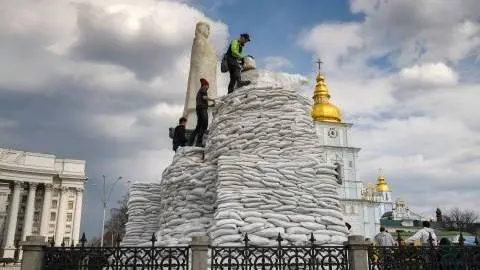Ukraine could be more of a game-changer for Europe than Covid-19
The war in Ukraine has completely reshuffled the cards in terms of security, supply chains and energy provision. This is likely to lead to lower growth potential and higher inflation in the eurozone
Say goodbye to the peace dividend
Europe has known a long period of peace, making it rather lax as far as its own security is concerned. Few European NATO members actually reach the 2% of GDP target for defence spending. Even when former US President Donald Trump made it very clear that Europe could not continue to freeride, largely counting on the US for its defence, things hardly changed. However, the war in Ukraine, only 1600km away from the European capital of Brussels, has made it abundantly clear that Europe has to step up to the plate to guarantee its own security. Several countries, most notably Germany, have already announced a significant increase in defence spending. But this is money that could otherwise be spent on more productive investments, therefore the long-term growth potential in these countries will be impacted. The peace dividend can no longer be counted on.
David Ricardo in reverse
During the Covid-19 pandemic, there was a lot of talk about the diversification of supply chains to avoid supply chain disruptions. At the same time, management journals were rife with analyses on inventory management evolving from “Just in time” to “Just in case”. With the current uncertainty created by the war in Ukraine, which is impacting the supply of commodities and semi-finished products in a great number of sectors, the urge to stock up inventories might be even bigger. But a higher inventory-to-sales ratio comes at a cost, which will ultimately make the final product more expensive.
A large difference between the pandemic and the war in Ukraine is that supply chains are no longer “only” disrupted but they could be destroyed for good. Containers from Asia will return to Europe at some point in time. Microchips will be produced and brought to Europe at some point. But products or commodities coming from or via Russia to Europe is highly unlikely. This fear of having a lack of crucial inputs in a more uncertain world might even be an argument for reshoring; bringing back the production of crucial inputs closer to home. While reshoring will probably be welcomed and subsidised by politicians and approved by public opinion, it of course completely disregards the welfare gains of the international labour division (the theories of David Ricardo in economics 101).
There was a reason why these industries moved abroad in the past. Bringing them back, when we don’t have a comparative advantage in them, is not something that will increase our growth potential and will instead lead to higher prices.
Expensive energy
The European Commission has already announced plans to reduce its energy dependence on Russia. While speeding up the development of renewable energy is probably a good thing for the European economy, it will still come at a cost in the transitional period, especially if Europe were to boycott one of the top exporters of fossil fuels. Substitutes for Russian gas will likely be more expensive or necessitate additional investments, thereby crowding out other productive investments. Energy-intensive sectors are already struggling and that might not improve much in the coming years.
All in all, the war in Ukraine has completely reshuffled the cards in terms of security, supply chains and energy provision. As a result, Europe will see a sharp acceleration of two major trends which already started to surface over the last years: decarbonisation and deglobalisation – as well as rising expenditures for defence. Prioritising these trends will come at a cost: higher government debt, higher inflation and lower economic growth. The nature of the eurozone’s economic model, i.e. a very open economy with high energy dependence, is a clear disadvantage in the coming years.
The only silver lining is that once the required transition succeeds, the eurozone could be leading in the areas of renewable technologies and energy. However, before the eurozone will get anywhere near such a scenario, it will first have to deal with a reduction of the growth potential and a higher inflation outlook.
This publication has been prepared by ING solely for information purposes irrespective of a particular user's means, financial situation or investment objectives. The information does not constitute investment recommendation, and nor is it investment, legal or tax advice or an offer or solicitation to purchase or sell any financial instrument. Read more
Download
Download article
31 March 2022
ING Monthly: There’s nothing normal about the global economy This bundle contains 17 Articles
